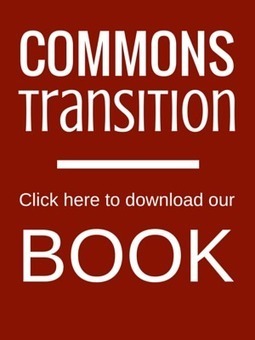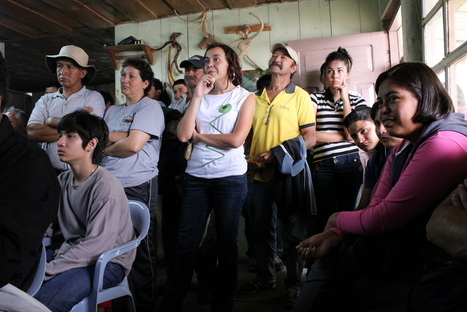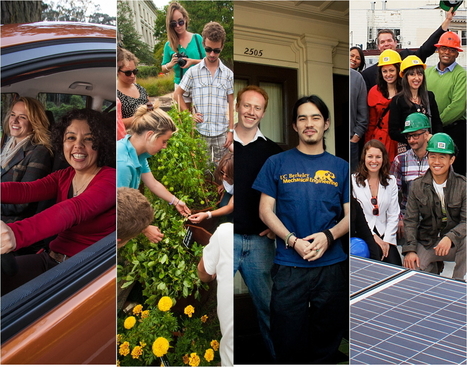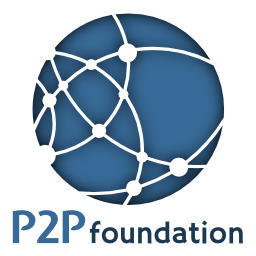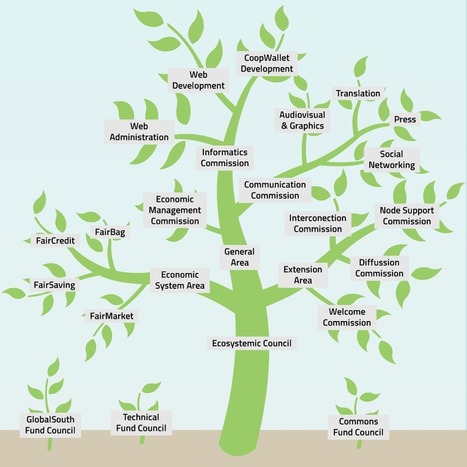 Your new post is loading...

|
Scooped by
jean lievens
January 30, 2015 1:31 PM
|
Social Knowledge, Solidarity Economy and the challenges of cultural transmission of values core to the sustainability of cooperatives and the commons

|
Scooped by
jean lievens
January 29, 2015 1:44 PM
|
“We can’t continue with a system that creates wealth, but that’s also destroying the planet and creating so much social inequality. I think that after 400 years of this, we know it doesn’t work. We need a new system to reclaim all these communal values”

|
Scooped by
jean lievens
January 27, 2015 3:27 PM
|
Reposted from our new Commons Transition web platform “Commoners in Transition” features exclusive global-P2P oriented interviews with people working on similar subjects, worldwide.

|
Scooped by
jean lievens
January 23, 2015 4:32 PM
|
(Introductory text by Michel Bauwens)
The General Assembly of the Catalan Integral Cooperative has confirmed a proposed partnership with the P2P Foundation.
This is an important development for several reasons.

|
Scooped by
jean lievens
January 23, 2015 3:47 PM
|
This is the Category Page for Commons Transition

|
Scooped by
jean lievens
January 21, 2015 1:49 PM
|
Chris: To me, a commons transition speaks to the process of communities progressively controlling and self-governing more and more of their collective resources, by and for themselves and future generations. The “transition” implies that we are moving from one system of organizing society – in this case, global capitalism – to a wholly distinct socio-ecological paradigm rooted in age-old practices referred to as “the commons.” What’s particularly interesting about this transition is that, in many ways, it’s a return to principles of managing our homes that evolved over millennia before the onslaught of industrial capitalism. Our contemporary context is obviously much different from the indigenous and peasant cultures that sustained commons-based societies for thousands of years, but we have much to learn from them in how to undertake this transition.

|
Scooped by
jean lievens
January 17, 2015 1:34 PM
|

|
Scooped by
jean lievens
January 15, 2015 4:35 PM
|
1) People are fighting privatization by refusing to recognise the state as the owner of public services and resources, instead claiming that they belong to the people. 2) Where public services are gone, people are organising themselves, locally and democratically, to provide the services they need. This included the provision of healthcare in the Greek example and the provision of housing in the Spanish example, but there are millions of others. 3) But there are also forms which kind of bring together both elements of the first two. These are struggles which both defend or demand the public provision of services while at the same time vesting ownership of services in the people and getting people involved in the democratic control of services.

|
Scooped by
jean lievens
January 15, 2015 4:15 PM
|
Here we present a Commons Transition interview with Enric Duran. Prior to co-founding theCatalan Integral Cooperative — a Commons Transition partner project creating a cooperative, self managed public system in Catalonia — Duran became famous for his 2008 “bank action”, an act which involved defrauding 39 Spanish banks of nearly €500,000 and subsequently distributing these funds to a variety of activist movements and social causes. He presently lives as a fugitive outside Spain, and is currently busy organizing the FairCoop Open Cooperative, a community-built effort to alleviate global economic inequalities through the use of mutual credit, reputation systems and cryptocurrencies.

|
Scooped by
jean lievens
January 13, 2015 3:36 AM
|
“We the peoples of the democratic autonomous regions – Kurds, Arabs and Assyrians (Assyrian Chaldeans, Arameans), Turkmen, Armenians, and Chechens – by our free will have announced this contract to establish justice, freedom and democracy in accordance with the principle of ecological balance and equality without discrimination on the basis of religion, language, faith sect or gender; to realize the values of a democratic society and a life together based in a political and moral framework which promotes mutual understanding and coexistence within diversity; and to ensure the rights of women and children, protection, self-defense and the respect of the freedom of religion and belief.

|
Scooped by
jean lievens
January 5, 2015 3:19 PM
|
At this time last year, I had just arrived in Ecuador as a researcher for the FLOK Society Project at the National Institute for Advanced Studies (IAEN). I was part of an international research team that had been recruited to develop policies for a “social knowledge economy” that could transform Ecuador’s productive matrix away from neo-liberalism and the dependence on oil extraction, to an economy based on the free and open access to knowledge.
|

|
Scooped by
jean lievens
January 30, 2015 8:33 AM
|
Social Knowledge, Solidarity Economy and the challenges of cultural transmission of values core to the sustainability of cooperatives and the commons

|
Scooped by
jean lievens
January 28, 2015 11:48 AM
|
Reposted from our new Commons Transition web platform “Commoners in Transition” features exclusive global-P2P oriented interviews with people working on similar subjects, worldwide.

|
Scooped by
jean lievens
January 24, 2015 2:52 PM
|
Degrowth is a historical necessity but a very hard political sell, and at the P2P Foundation we use rather the post-growth thematic and a focus on ‘thrivability’. But these proposals from Giorgios Kallis seem entirely reasonable and even vital.

|
Scooped by
jean lievens
January 23, 2015 4:31 PM
|
Our News and Articles section features interviews and articles involving Commoners in Transition, or, individuals and teams working together towards increasing the viability of the commons.

|
Scooped by
jean lievens
January 23, 2015 3:45 PM
|
With the prospect of a Syriza government, everyone is wondering what the future holds for Greece. Whether disaster or deliverance, or just the normal chaos, it is hard to ignore the potential for game-changing repercussions from a Syriza government. On the street however, embittered by the failures of governments in the past to change a corrupt and dysfunctional political system, few people are expecting big things from Syriza. The feeling of popular cynicism and fatalism is palpable. How different will Syriza be?

|
Scooped by
jean lievens
January 19, 2015 4:00 PM
|

|
Scooped by
jean lievens
January 17, 2015 1:31 PM
|

|
Scooped by
jean lievens
January 15, 2015 4:17 PM
|
With the prospect of a Syriza government, everyone is wondering what the future holds for Greece. Whether disaster or deliverance, or just the normal chaos, it is hard to ignore the potential for game-changing repercussions from a Syriza government. On the street however, embittered by the failures of leftist governments in the past to change a corrupt and dysfunctional political system, few people are expecting big things from Syriza. The feeling of popular cynicism and fatalism is palpable. How different will Syriza be?

|
Scooped by
jean lievens
January 13, 2015 3:55 AM
|
Through our research and activities, we make a case for implementing economic sharing as a pragmatic solution to a broad range of interconnected crises that governments are currently failing to address – including hunger, poverty, climate change, environmental destruction and conflict over the world’s natural resources.

|
Scooped by
jean lievens
January 11, 2015 6:59 AM
|
“What we need to aim for is not only public-social partnerships but also commons-university partnerships moving to concepts of communiversity. During the late 1970s and up to 1985 before Reagonomics secured a strangle hold on thinking, there were something akin to ‘communiversity partnerships’ then co-developing the paradigm shifting ideas of Ivan Illich and Schumacher and these hubs were linked to Alternative Technology Networks. In the USA I was in the 1970s a member of the Union of Radical Political Economists and when I came to England in 1978 involved with several of these networks that actually helped found NEF in 1987. Robin Murray was very involved with these Technology networks both through Sussex University and when working in the early 1980s as the lead economist with the Leader of the Greater London Council, Ken Livingstone. However 1989 as a turning point snuffed out this connectivity to the academies.

|
Scooped by
jean lievens
October 29, 2014 8:30 PM
|
The rise of information and communication technologies (ICTs) as the driving force of globalization, has generated an intense interest in the use of ICTs for the promotion both of good government and of social development in the operations of modern democratic societies. This is particularly so with respect to the role of civil society as a force for the progressive democratization of politics and for the alleviation of social and economic inequities. The relevance of ICTs in this respect is also central to the promotion of what has been described as Good Living (Buen Vivir) as the defining purpose of Ecuador’s National Plan. Open Government and an empowered and engaged civil society are the political prerequisites of such a transition.
|
 Your new post is loading...
Your new post is loading...







